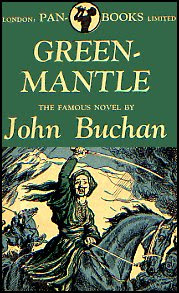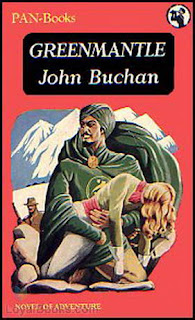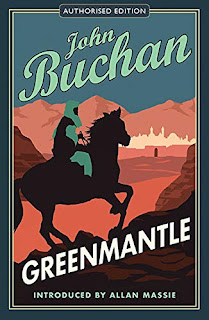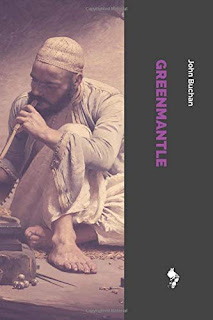These days
to make it in Hollywood it would have to have a better title than
Greenmantle,
which sounds too much like some freak comic-book superhero. On second
thought, comic-book superheroes are precisely what Hollywood hungers
for these days, pretty much bumping from the pinnacle of adolescent
necessity the shadow-faced manly-looking men and voluminous-lipped
edgy women (with their stunt doubles) in those derring-do popcorn
thrillers older adults risk peeing their pants before missing a
single onscreen second.
While
Greenmantle
is in fact a quintessential heroic flesh-and-blood action thriller,
albeit taking place before the advent of the electric razors that
allow the manly-looking man to sport the de rigueur permanent
shadow-face that sets the edgy woman’s bee-stung-lips aquiver, its
plot would be dangerously incorrect from progressive viewpoints in
that it paints Islam as an evil would-be empire courted by evil
Germany as the key to bumping off the righteous British Empire in
World War I. Of course, were something “based on” Greenmantle
to be filmed tomorrow modern changes most certainly would be made
regarding the shadows and lips and politics and prejudices. And the
title.
We could
have some fun here, as author John Buchan’s protagonist, Richard
Hannay, is the same hero of The
Thirty-Nine Steps,
which
The
Guardian
listed
in
2014 as one
of the 100 best novels in the English language. It’s
been
filmed
several
times,
the first by Alfred Hitchcock in 1935. I
doubt as memorable a Hollywood title could be cooked up for
Greenmantle,
but in keeping with the crucial marketability of twenty-first century
commercial filmdom one might consider at least subliminal references
to Lawrence
of Arabia, Indiana Jones,
The
Wizard of Oz,
and The
Magnificent Seven.
I’d
probly pay ten bucks for a small multiplex popcorn to see Four
Righteous White Dudes Hunt the Stunning Evil Witch of Constantinople,
or perhaps something a tad shorter, like Ho-ly
Scheisse!,
or maybe wait to catch it at the neighborhood theater where the
popcorn’s only six bucks. (You should go while it’s still on a
big screen, though. I don’t believe DVD could do it justice.)
But
seriously, friends, Greenmantle
truly is a most excellent romp of a buddy pic with some genuinely
dangerous villains (including
a ruthlessly hypnotic babe)
and gaspworthy political and ethnic observations reflecting the time
(1916). Such as:
The
“Kaiser will fling overboard a lot of ballast in Europe, and it
will look like a big victory for the Allies, but he won't be beaten
if he has the road to the East safe. Germany's
like a scorpion: her sting's in her tail, and that tail stretches way
down into Asia.”
As
our adventure begins, Richard Hannay, an army Major recuperating from
an especially bloody battle with German troops in West Africa, is
recruited to lead an undercover mission penetrating a mysterious
German plot to unite the Arab nations against Britain and its allies.
He assembles two men to join the mission. His first pick is Sandy,
“Sandy...the wandering Scot carried to the pitch of genius. In old
days he would have led a crusade or discovered a new road to the
Indies. Today he merely roamed as the spirit moved him, till the war
swept him up and dumped him down in my battalion.”
Next
comes John Scantlebury Blenkiron. a dyspeptic American, recommended
by Sir Walter Bullivant, the Foreign Office official who’d
recruited him, and with whom Hannay had worked previously in The
Thirty-Nine Steps.
Blenkiron,
a citizen of Boston, who’d been born and raised in Indiana, “had
done wonders for the Allies in the States,” Bullivant had told
Hannay in selling him Blenkiron. “He had nosed out the Dumba plot,
and had been instrumental in getting the portfolio of Dr Albert. Von
Papen's spies had tried to murder him, after he had defeated an
attempt to blow up one of the big gun factories. Sir Walter had
written at the end: 'The best man we ever had. Better than Scudder.
He would go through hell with a box of bismuth tablets and a pack of
Patience cards.”
The three
don’t have much to go on, only a notion learned by Bullivant’s
son that the Germans believed some uniting figure, code named
“Greenmantle.” would soon arise in the Middle East, and, with a
little persuasion from the Kaiser’s agents, could turn the world of
Islam to the German point of view. “Islam is a fighting creed, and
the mullah still stands in the pulpit with the Koran in one hand and
a drawn sword in the other,” Bullivant has told Hannay, a
sentiment
shared
by many in the West since 9-11 but
dismissed as
racist hysteria
by
many others in the West at this very moment.
Bullivant’s son, as he was
being murdered by “enemies” in the Middle East, was able to
transmit three cryptic words his father believes are clues to the
identity and whereabouts of the unknown uniting figure. Ruminating on
this seemingly impossible mission with Sandy and Blenkiron, Hannay
has second thoughts: “Suddenly I had a feeling that the whole
affair was stark lunacy. Here were we three simpletons sitting in a
London flat and projecting a mission into the enemy's citadel without
an idea what we were to do or how we were to do it.”
They decide
to split up and travel on different roads, agreeing to meet up in
Constantinople by a certain date. Along the way, Hannay recruits
Peter Pienaar, a prospector/hunter/soldier of fortune Hannay knew
from time he’d spent in Africa. “In those early days he was none
too good a citizen. He was in Swaziland with Bob Macnab, and you know
what that means,” he tells us. I don’t have an inkling what in
hell that means other than that Hannay knows and trusts Pienaar as a
valuable addition to his team.
Because
Hannay’s narrating this tale, we see, hear, and feel only what he
sees, hears and feels on his trek with Pienaar toward Constantinople,
at one point going undercover as a couple of Dutch adventurers who
get caught up with a nasty German Col. von Stumm, whom they must
convince they hate the British. Stumm is a true heavy here, and ends
up pursuing the two half the way to Constantinople. Stumm, Hannay
muses, “was
a man of remarkable qualities, which would have brought him to the
highest distinction in the Stone Age.”
Along the
way, Hannay’s and Pienaar’s paths cross several times with those
of Sandy and Blenkiron, who often save their skins in the nick of
time. Eventually they learn the real villain, whom even Stumm fears,
is a woman. At one point unbeknownst at first to them, she becomes
their landlady. Blenkiron has the misfortune of experiencing her
before the others:
“ ‘I've
been to see our pretty landlady,' he said. 'She sent for me and I
hobbled off with a grip full of plans, for she's mighty set on
Mesopotamy.'
“ 'Anything
about Greenmantle?' I asked eagerly.
“ 'Why,
no, but I have reached one conclusion. I opine that the hapless
prophet has no sort of time with that lady. I opine that he will soon
wish himself in Paradise. For if Almighty God ever created a female
devil it's Madame von Einem.'
“He
sipped a little more milk with a grave face. 'That isn't my duodenal
dyspepsia, Major. It's the verdict of a ripe experience, for I have a
cool and penetrating judgment, even if I've a deranged stomach. And I
give it as my considered conclusion that that woman's mad and
bad--but principally bad.' ”
Hannay, of
course, soon has his own meeting with the bad lady, and—surprise
surprise--she likes him.
Hannay
shares with us some ruminations on the German people. This, for
example:
“I
realized something of the might of Germany. She produced good and
bad, cads and gentlemen, but she could put a bit of the fanatic into
them all.” Three-quarters of my blood is German, and I suppose I
should take offense, but...I agree with Hannay. And perhaps it is
safe to say it
applies as well to a
majority of the recent U.S. electorate?
Without
any particular context I recall, Hannay offers us another gem:
“To be able to laugh and to be merciful are the only things that
make man better than the beasts.”
And
here’s Blenkiron contemplating the “bad and mad” Madame von
Einem in an observation that still rings true:
“My trouble is that she puts me out of countenance, and I can't fit
her in as an antagonist. I guess we Americans haven't got the right
poise for dealing with that kind of female. We've exalted our
womenfolk into little tin gods, and at the same time left them out of
the real business of life. Consequently, when we strike one playing
the biggest kind of man's game we can't place her. We aren't used to
regarding them as anything except angels and children.”
And who
would argue with this from
Sandy? “I
fancy it isn't the men who get most out of the world and are always
buoyant and cheerful [who] most fear to die. Rather it is the
weak-engined souls who go about with dull eyes, [who] cling most
fiercely to life. They have not the joy of being alive which is a
kind of earnest of immortality…I know that my thoughts were chiefly
about the jolly things that I had seen and done;
not regret, but gratitude.”
More
and more I’m liking Ho-ly
Scheisse! for
the
movie.
[For
more Friday's Forgotten Books check the links on
Patti
Abbott's unforgettable blog]




I never thought about it too much but Greenmantle as a title does not convey much. Although many books today have nonsensical titles. I do plan to read it someday.
ReplyDeleteI think you'll love it, Tracy.
Delete